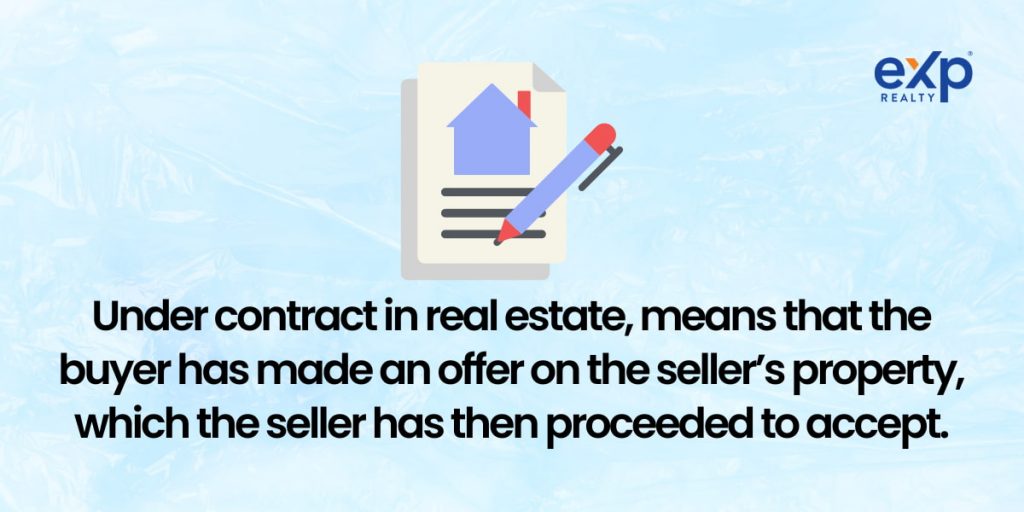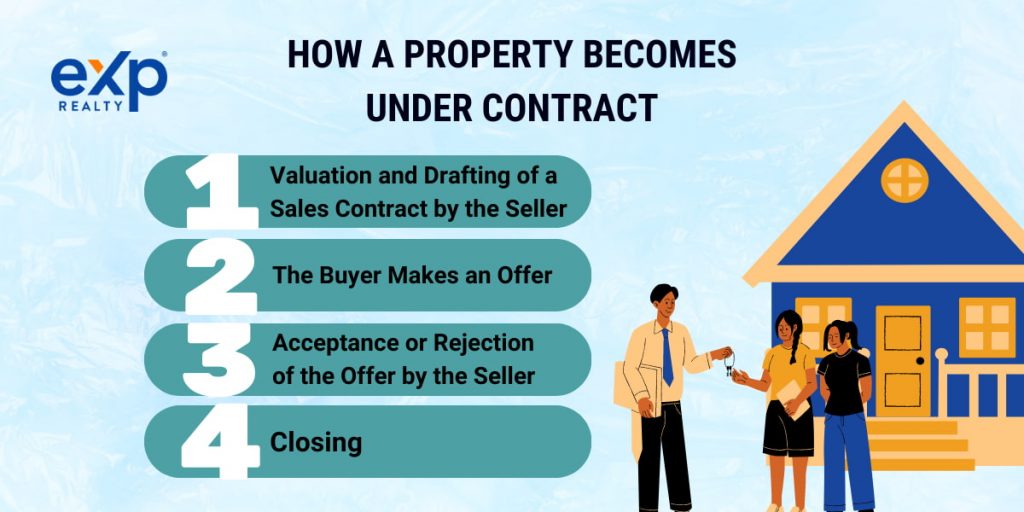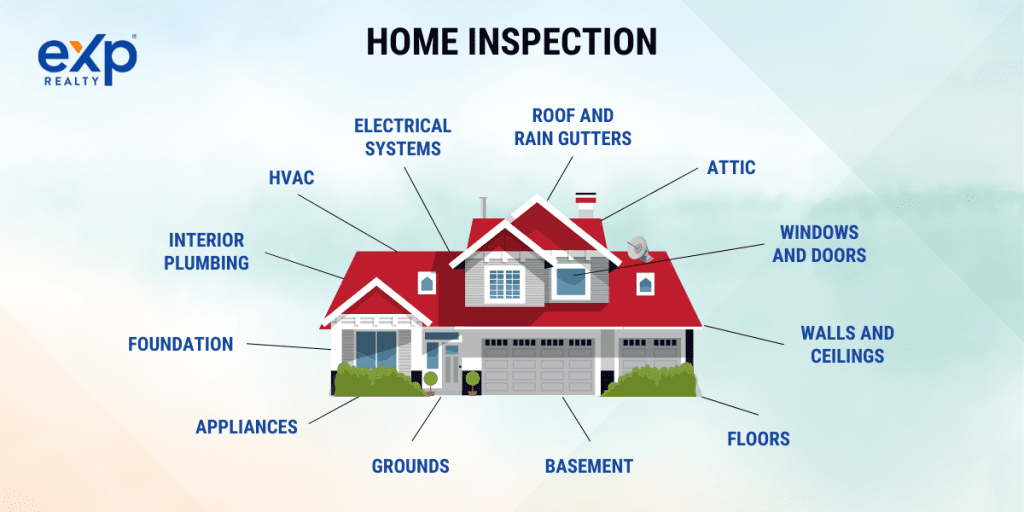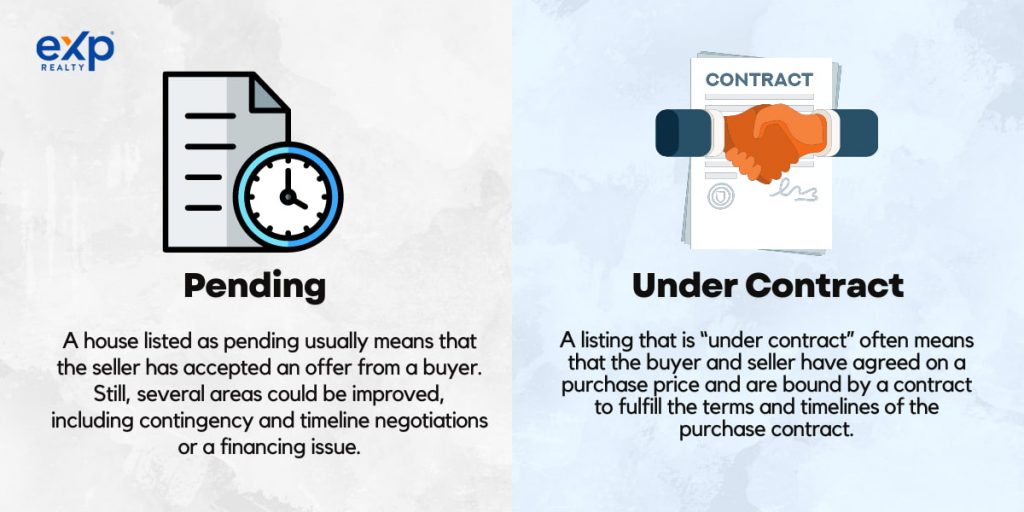Navigating the process of a real estate transaction, whether buying or selling a home, can be an intimidating undertaking. For the most part, you need an acute knowledge of the various terms and phrases to grasp multiple sales process stages.
Most people will leave this part of the buying or selling process to their real estate agent. Ideally, that’s what they are for. But getting down and dirty is often not an option for those fighting alongside their realtor to secure their best interest.
If you are wondering what a house “under contract” means in real estate, then it is safe to assume one of two things. You might have come across a gem that checks all your boxes (be it an exceptional school district, a gated community, granite kitchen counters, or even a pool) and are unwilling to let it slip away from your grasp. Or, as is often the case in the North Carolina real estate market, you might be looking for a house in a very hot market (or simply a competitive market).
In simple terms, a property listed as “under contract” is usually where a buyer has made an offer to the seller, and the seller has accepted the offer. Still, the contract has contingencies that must be met before closing the sale. If this is hard to wrap around, stick around for a detailed description of the different contracts involved in the home-buying process.
What Does Under Contract Mean in Real Estate?

Under contract in real estate, as described earlier, means that the buyer has made an offer on the seller’s property, which the seller has then proceeded to accept. In so doing, both parties are working towards fulfilling all contingencies before a specific deadline is reached. Now that you know what this means, this still doesn’t solve your predicament on that gem of a house on the real estate market.
To better understand the implications of a property being listed as “under contract” on a real estate website, you should take a step back and try to understand the backstory behind how the property got there in the first place.
There are several contracts involved in different stages of the sales process, and the purchase contract is only one among them. You will benefit from an in-depth analysis of this and other related contracts before the next time you meet your real estate agent to discuss buying or selling property.
How a Property Becomes Under Contract
In the spirit of taking a step back, you must understand how a property goes under contract in the first place. Depending on the type of real estate market in which the property is listed, the process may vary at different stages.
In addition to the kind of market, factors such as the state and region you are in can impact the process of transforming real estate active listings into “under contract” properties. Regardless of your regional location, below are the critical steps to make a property “under contract.”

Step 1: Valuation and Drafting of a Sales Contract by the Seller
Before a property is listed as actively for sale, the seller must undergo several steps to meet local guidelines and legal considerations. The first step is usually carried out by a professional appraiser and involves the valuation of the property.
This helps the seller to draft a sale price for the property. In addition to valuation, the seller has to create an escrow account to facilitate the fees for the sale of the house, including the earnest money deposit. A draft of a declaration document is also created to highlight home features that might directly impact the house’s desirability.
Once the seller and the seller’s agent are satisfied with the initial documents, they may then proceed to list the property on the MLS (multiple listing service), on a listing platform, approach an iBuyer, or a property investor (cash buyer). Once the property is in this stage, it is said to be actively on sale, and the seller can receive various offers from different sources.
Step 2: The Buyer Makes an Offer
After the house is listed as actively on sale, the buyer and their real estate agent might find it on multiple platforms, and if the buyer is interested, they draft an offer for the seller. The offer may vary significantly depending on whether the buying process is taking place on a seller’s or a buyer’s market. In a market that favors the buyer, the offer may be lower than the sale price provided by the seller.
In markets that favor the seller, such as properties in prime locations, with high demand and insufficient home supply, the buyer may exceed the selling price of the buyer in an attempt to make their offer stand out. The buyer might also offer to pay the fees expected in the closing process that the seller would otherwise pay. All this is done with the thought that the buyer has received several attractive offers in mind, and therefore the buyer has to show goodwill and thus attract the seller’s attention.
Occasionally, the buyer may opt to engage the seller in an active option contract to show that they are interested in purchasing the property, but only after carrying out their due diligence.
An active option contract guarantees the buyer the property price will remain constant regardless of external market forces and, simultaneously, ensures the seller has a buyer for their property within a specified period.
The buyer will often pay a non-refundable fee to the seller to reserve the right to buy the property at the purchase price. However, they are not legally obligated to see the purchase through.
Once the buyer and their real estate agent are satisfied with their offer, they send it to the buyer’s agent.
Step 3: Acceptance or Rejection of the Offer by the Seller
Once the seller’s agent receives the buyer’s offer, they can reject it if it does not meet their expectations or accept it. Occasionally, the seller might approach the buyer to improve on their offer before they reconsider it. This is especially true when the buyer’s offer is slightly shy of the seller’s expected price.
Once the seller accepts the seller’s offer, the house goes into the “under contract” stage. However, there are several contingencies and timelines that the buyer and seller need to meet to fulfill the purchase contract. The most common contingencies and timelines are described in detail later in this article.
At this stage, a real estate contract is drafted in which the buyer and seller outline all the terms and conditions that apply to the sold property. This may include contingencies, the agreed purchase price, and the expected closing date. The real estate contract, therefore, is the binding document that transforms a house from being actively on sale to being “under contract.”
Step 4: Closing
Once all parties involved in the property sale are satisfied that their best interests are provided for, the seller and buyer’s agent begin closing the transaction. This stage involves transferring ownership of the house from the seller to the buyer after the buyer wires the money to an escrow account set up for the home. Typically, an intermediate period between a house going under Contract and completing the closure phase is present and is often termed the “pending phase.”
You might have seen a house listed as under Contract or pending, and even though some realtors use these words interchangeably, they have different meanings and implications for potential buyers.
Pending, in most cases, in a fair market means that both the buyer and seller have agreed to the terms of the purchase contract and are beyond the contract stage but still need to sign appropriate closing documents or kickstart the financing process.
The Significance of a Property Being Under Contract

You fully comprehend what it means for a house to be under Contract, but another critical question needs to be answered. What does this mean to a prospective buyer interested in making an offer for the property? You would have to read between the lines in the real estate contract between the buyer and seller to get an accurate picture of the status quo.
In most places, including North Carolina, a house being under contract means that plans are underway to fulfill the purchase contract; therefore, the seller is in a position where they can’t receive offers from other buyers. Similarly, the house is not listed as actively for sale. Consequently, the prudent thing would be to continue your treasure hunt and look for a new building to house your future.
However, on rare occasions, the house might have you in a restricting position, and letting go might be more challenging than moving on to the next open house in town. In this case, there are several steps you may take through your real estate agent to ensure you are next in line should the negotiations break down at any stage of the sales process.
Unfortunately, if the buyer backs out from the purchase, the seller is not obligated to disclose the reason. However, with a qualified inspector, you can turn every stone before committing to the property purchase should you get to that point.
Submitting a Backup Offer
It would be wise to consider the following statistics from the National Association of REALTORS® before proceeding with submitting a backup offer:
- 20% of houses listed under contract will not complete the purchase contract.
- 8% of the houses listed as pending will not reach the final stage of negotiations.
If these odds don’t put you off, you may draft a letter similar to a letter of offer in which you show your interest in their property and commitment to complete the purchase should their ongoing negotiations break down. It is always prudent to make your offer stand out from other backup offers that may have been submitted.
Contingencies and Timelines for a House Under Contract
Before a house is cleared from being under contract to kickstart the pending phase of the negotiations, several contingencies and timelines need to be met. This may be either on the buyer’s or the seller’s side. Before they are completed, either party may withdraw from the negotiations without being charged a fine. The most common contingencies include the following:
Financing Contingency
Financing contingency refers to a provision for the buyer to back out of the purchase agreement should they cannot obtain financing for the property in question. This is meant to protect their deposit and often stipulates the nature of the loan they seek. This contingency also protects the seller by guaranteeing them a sale should the buyer obtain appropriate financing.
Inspection Contingency

The inspection contingency is a provision for the buyer to withdraw from negotiations if they uncover an undesirable aspect of the house that directly impacts its value. Alternatively, the two parties (seller and potential buyer) might renegotiate the purchase price if there are inspection issues.
Appraisal Contingency
Appraisal contingency allows the buyer to back out of the sales process when their appraiser values the property far below the purchase price stipulated by the seller. In most cases, the appraisal is supposed to be no less than the buying price and should, preferably, be higher.
Title Contingency
The title contingency is a provision in the purchase contract that allows the buyer to withdraw from negotiations whenever there is a concern or dispute around the title deed of the property. There is often a time period allocated to the buyer to carry out due diligence on the state and legitimacy of the title deed to the property.
Homeowners Association (HOA) Contingency
Under the provisions of this contingency, the buyer may withdraw from negotiations if they are unsatisfied with the state of the property, with the bylaws, or inspection requirements of the governing body, which is usually the Homeowners Association (HOA).
Differences Between “Under Contract” and “Pending”

The real estate terms “pending” and “under contract” have been used extensively in this article and serve different purposes in the real estate context. Similarly, these stages also have other implications for any prospective buyer.
A house listed as pending usually means that the seller has accepted an offer from a buyer. Still, several areas could be improved, including contingency and timeline negotiations or a financing issue. During this stage, the seller is open to receiving additional offers but may choose to limit this should they be sure of the negotiations ending in their favor.
A listing that is “under contract” often means that the buyer and seller have agreed on a purchase price and are bound by a contract to fulfill the terms and timelines of the purchase contract. In most cases, the only milestone to overcome is the closing process and inspection. During this stage, the seller may not receive additional offers from interested parties but may accept backup offers.
Key Takeaways
Now you have the answer to the question, “what does under contract mean in real estate?” Depending on whether a property is listed as “under contract” or “pending,” you may or not be able to make a bid through your real estate agent.
However, before the gavel slams down to announce that the house is sold, the negotiations might halt at different stages, allowing you to bid freely for the property. So don’t lose hope if you see a house you love “under contract.” Contact a local expert real estate agent to increase your chances.
FAQs: What Does Under Contract Mean in Real Estate
If you still have doubts about what under contract means in real estate, these frequently asked questions and respective answers might you understand this subject better:
If a house is “under contract,” are you obligated to buy it?
When it becomes “under contract” secondary to an agreement between you and the seller, you must complete the purchase unless the aspects highlighted in the contingency are not met. Failure of this might result in a fine.
Is under contract the same as sold?
A house being under contract means that the buyer and seller are still going through the stages of negotiations, and the house, therefore, is not sold.
Can you still bid on a house that is under contract?
You are not allowed to bid on a house under Contract, but you may submit a backup offer to alert the seller that you would be interested in making the purchase should negotiations break down.





